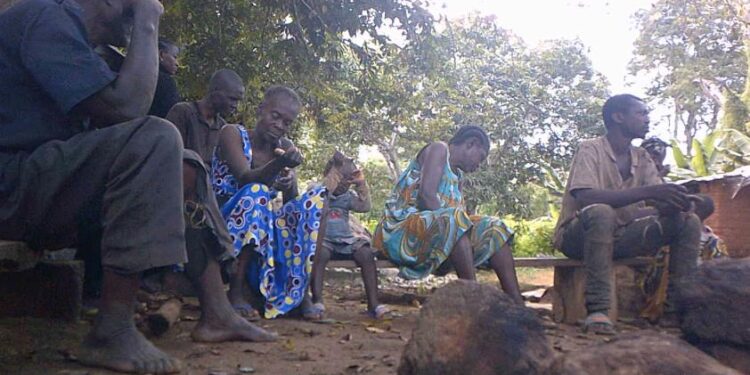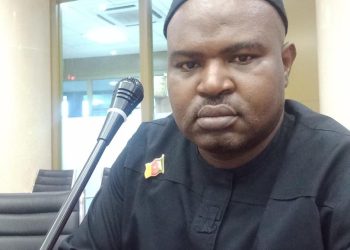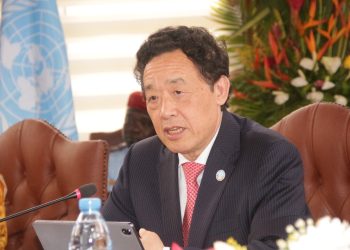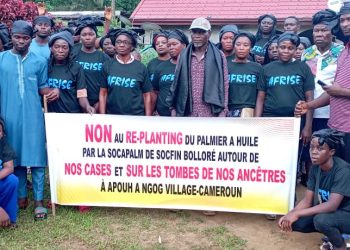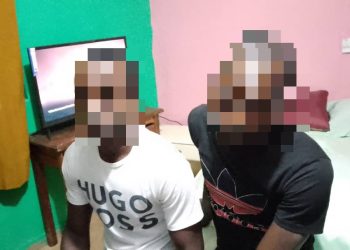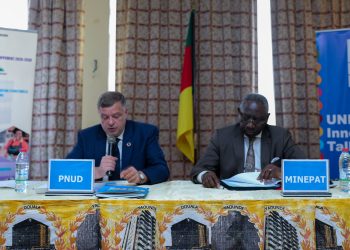The population of the Upper Sanaga division, in the centre region of Cameroon, have been going through a night mare to find what to eat on a daily basis. Their crime is that a Chinese agro industry took interest in the agricultural potentials of their farming sites.
By Vanissa Mafouokeng
They were then forced to watch the pieces of land that served them to farm and hunt being snatched away from them.
“How can we sit and fold our arms when we have been deprived of our land? We use this land for various purposes. My brother sited there is a hunter while I am a farmer. Some of us here cultivate 10 ha of land per year while others plan to do more, that is to farm on 15 to 20 hectares of land each year. Where are we going to work when they have seized a large portion of the forest?” Declared an indigene of Biwoung, one of the villages worst hit by the Chinese rice cultivation project.
In 2006, a Divisional Committee for Findings and Evaluation created by ministerial decree alongside some Chinese, arrived Biwoung, a remote locality in the savanna region of Upper Sanaga. Without consulting inhabitants of the village they went straight into the forest and demarcated over 250 hectares of land.
The same exercise was carried out in 4 nearby villages. In Nkoambang, natives surprised them in the forest, took up machetes and chased them away. In another small locality called Mengang where vast pieces of land were grabbed, the population now has to move to nearby villages to farm.
“We cover long distances everyday either on foot or on motor cycles to get to nearby villages where we rent land to cultivate what to eat. If we don’t do like that we will die of hunger because there is no land left in our small village” declared Bessala Jean Ngono Charles, son of the Chief of Mengang.
The native adds that after the departure of the group of persons who staked out their land, his father and himself travelled to Nanga Eboko where they met with the then Divisional Officer to complain that they had seen Chinese workers in their farms.
The administrative authority assured them that what the Chinese were doing was legal. He told them not to worry that the Chinese had passed through the main door before arriving their village. In other words “the Chinese were acting on instructions of the government”. The Divisional Officer also assured them that they would be compensated at the right time. While the promise was never fulfilled, some natives paid with their liberty the protest they staged against the land grab initiative.
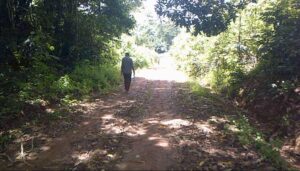
Fa’a Embolo native of Wala narrates his ordeal; “in 2009 I learnt that a group of persons had used trucks to get into the forest and carry out some activities. I went there and didn’t find them but I realized that they had demarcated our family land. In reaction I fell down three trees to block the local road that I had created to stop them from coming back. In 2011 on the 24th of May the Senior Divisional Officer (SDO) alongside two gendarmes and the Nanga Eboko brigade commander arrested me for obstructing the Chinese agricultural project and locked me up. On the 31st of May the SDO signed an administrative order for me to be transferred to the Nanga Eboko principal prison. After 15 days I asked prison authorities to free me and they said the SDO had renewed my detention order. On the 30th of June I was presented before a judge who heard me and sent me back to prison. My court case dragged on and I proved that those who demarcated our land were wrong to do so because my village was not amongst the villages that the minister of Land Tenure gave to the Chinese. Because they could not admit their fault the trial went on and I was finally slammed a one year suspended trial and set free. I appealed the verdict and it was cancelled”.
While Fa’a Embolo was in prison the Chinese and the Divisional commission for Findings and Evaluation went ahead to demarcate 1,500 ha of land in his native Wala.
“Our problem now is for the government to give us back our land. That is why as family head I plan to sue the state before the Nanga Eboko administrative court for our land to be given back to us ». He added.
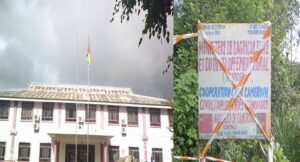
At 6 kilo meters away from Nanga Eboko the chief town of the Upper Sanaga division, is Bifogo a small locality of about 60 inhabitants. It is situated precisely on the newly built highway linking the centre to the East region. Along the road, a yard fenced with a zinc gate is easily noticeable. At the entrance is a sign board with a large red cross under which can be clearly read the words “Ministere de l’Agriculture et du Development Rural, (MINADER) Cooperation Chine Cameroun “. Behind the zinc fence is a structure in ruins.
Depreciating buildings, abandoned store rooms, tractors that are gradually being engulfed by grasses, decaying four wheel pick up vehicles, the structure that use to house the Chinese rice farm has become a shadow of its self.
In the middle of the court yard, the Cameroon flag is still proudly flying high while that of its partner china has disappeared. As for the training centre (one of 15 agricultural technology demonstration centers that the government of China committed to build in Africa at the Beijing Summit of Sino –African cooperation in 2006), the state of walls and the tiers floor speak for themselves.
In what were suppose to be class rooms brand, new tables and benches are still in place but teachers are absent. All around the structure, the vast hectares of land that stretch right up to the banks of river Sanaga used by the Chinese for rice cultivation and the experimentation of cash crops and tubers have been swallowed by over grown grasses. No single rice, cassava, or maize plant can be spotted.
From what we gathered in the village the Chinese left Cameroon 2 years ago abandoning everything behind them. CENEEMA (Centre national d`etudes et d`Experimentation du Machinisme Agricole) has now taken over control but is delaying to kick off work.
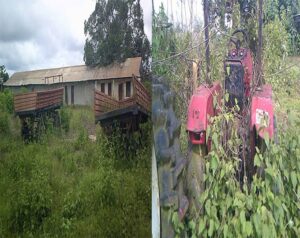
Sino- Cam IKO Ltd otherwise known as IKO Ltd is in reality a subsidiary of the Chinese state owned conglomerate “Shaanxi land Reclamation General Corporation” also known as “Shaanxi State Farm”. Thanks to bilateral relations between Cameroon and China the company arrived Cameroon in 2006 and signed a US120 million investment agreement with the state as well as a 99year lease for 10,000 ha of land in Nanga Eboko (2,000 ha close to the rice farm) 4,000 ha in nearby Ndjore and 4,000 ha in Santchou in the West region of the country.
In 2009 the Chinese needed more land to expand their agricultural project as such, the minister of State Property, Surveys and Land tenure signed an order granting them an additional 100 ha of land in Nkoteng, Nkoteng sub division, Ndjore in Mbandjock sub division, Akak, Bifogo, Ndokoti and Boundja in Nanga Eboko sub division.
However in the field what was to be given to the Chinese in principle was not respected in practice. IKO Ltd ended up with an additional 6,181 ha of land in 5 other villages; Biwoung, wala, Nkoambang, mengang and minkouma.
Today the Chinese are gone but the contracts signed with the state of Cameroon remain. The over 6,000 ha of land are unoccupied and villagers from who these hectares of land were taken from are deprived of their main sources of living (farming and hunting).
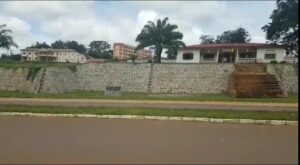
Accosted on the state of living of the population of the Upper Sanaga, the mayor of Nanga Eboko, Romain Roland Eto and the Senior Divisional Officer of Upper Sanaga, Nanga Dang Albert declared that not all what the people say is true. As concern the land expropriation issue, they both declared not to know anything about the subject.
At the Divisional Delegation for State Property, Surveys and Land Tenure, the Divisional delegate, Ngomono, turned us off. Seemingly, we tried to no avail to get clarifications on the Chinese agricultural project at the ministry in Yaoundé.
Meanwhile at the ministry of Agriculture and Rural Development, the divisional delegate, Zeh Efouda Jean Marie stated that;
“there is no land problem in the Upper Sanaga. You can ask the Mayor or the Senior Divisional Officer. The Chinese rice cultivation project is a project that dates back to when Amadou Ahidjo was still president. These pieces of land you’re talking of were first exploited by the Taiwanese before being abandoned. The people took opportunity and started farming on them. When the Chinese came the government of Cameroon simply allowed them to carry on with their activities on part of the land while the other part (2,000 ha) was given to the Chinese agro industry IKO”.
For Non-Governmental Organizations (NGOs) who worked on the project (the Center for the Environment and Development, CED and the Network for the fight against Hunger, RELUFA) it is glaring that the people’s rights were trampled upon.
Ordinance no 74-1 of 6 July 1974 in article ii on private property states in its article 12 that “for the achievement of objectives of general interest, the state may resort to the procedure of expropriation”.
“This procedure is initiated either directly when it aims to carry out operations of public, economic or social interest or indirectly at the request of councils, public establishments or public service concessionaries, when attempts to amicable settlement between these organizations and the owners has proven to be unsuccessful”.
Article 13 further states that “organizations benefiting from the expropriation are required to compensate the victims on their budget”.
This article was produced with financial assistance from the Congo Basin Rainforest Journalism Fund/Pulitzer Center.

